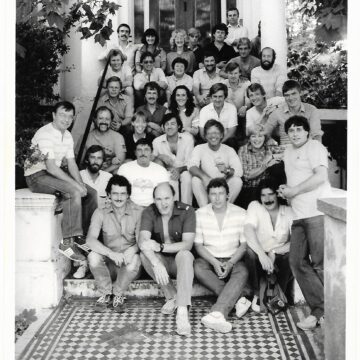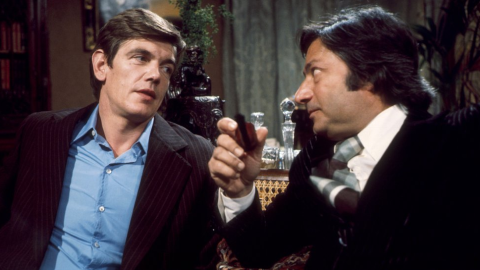The Roses of Eyam – An interview with producer David Rose conducted by Ben Lamb
 Don Taylor’s television adaptation of his own stage play The Roses of Eyam (1973), which he wrote and directed, was filmed at Pebble Mill studios and broadcast on BBC2 at 9pm on 12/6/1973.
Don Taylor’s television adaptation of his own stage play The Roses of Eyam (1973), which he wrote and directed, was filmed at Pebble Mill studios and broadcast on BBC2 at 9pm on 12/6/1973.
As a full length play independent of an anthology series, The Roses of Eyam is an unusual and distinctive text. Produced by David Rose’s English Regions Drama department the play was shot entirely on videotape in Studio A and depicted the story of the quarantined villagers who sought to protect the rest of Derbyshire from the bubonic plague in 1665. This television play sits in stark contrast with Rose’s other English Regions Drama plays such as Alan Plater’s Land of Green Ginger (1973) and Peter Terson’s Fishing Party (1972)that were shot entirely on film and were set in authentic contemporary locations to address modern day political problems facing 1970s Britain.
I began by asking David where he saw The Roses of Eyam fitting into this canon of texts he was producing at Pebble Mill at that time:
In a way, I surprised myself by producing Don Taylor’s play. From the beginning, working in the Television Drama Department of DDC Television, I had only dabbled in the Single Play, as Assistant Floor Manager, then Production Assistant. I soon found myself directing, and producing (terms which were not then clearly defined – another matter) in a small unit of Drama, headed by Elwyn Jones. Our area of concern was the writers’ accuracy during research, in areas that generally proved to be ‘the work place’. Black Furrow by Elaine Morgan, dealing with opencast coal mining; Who Pays the Piper? concerning Regional Symphony Orchestras, written by John Eliot.
I only mention this because when I was invited to head a small new group at Pebble Mill Studios, Birmingham, the opportunity arose to cover any aspects of drama that I wished. The content of the 30 minute play strand, Second City Firsts, mainly video studio plays – and Play for Today, mainly location films – were contemporary.
It was Don Taylor’s proposition that I must have been compelled by. I frankly felt that his approach was too close to theatre – even somewhat ‘old fashioned’. But I backed it – and very much welcomed his desire to accompany it with a short documentary investigation. Transmitted the night prior to the film, it proved to be an excellent and effective trailer for the play.
I then asked David why the play was so well received by the public given the vast amount of congratulatory letters sent to him personally that can be found at the BBC Written Archives in Caversham:
I think the project’s strength lay in the very direct manner of storytelling – no director’s pretentious fireworks. And, the story itself. of people’s courage in the lifestyle of 17th century everyday acceptance of life as it was led. Add to this a cast of first class actors.
Curiously, I watched a Danish film only this week which had a curiously similar approach –reminding me of Eyam. A Royal Affair, directed by Nikolaj Arcel, a tale of brave idealists who risk everything in the pursuit of freedom for the people, a story that changed a whole nation’. A film that is nominated for the European Film Academy Awards.
As the village of Eyam was unable to receive BBC2 transmissions when the play was broadcast, the BBC decided to screen it at the Church of St. Lawrence using eight television monitors. I asked David how the residents of Eyam responded to watching the play in the authentic surroundings of their own 12th Century church:
I don’t have a vivid memory of it; but it seems to demonstrate the importance of a particular place and time in peoples’ lives. I shall be introducing Mike Leigh’s film, Nuts in May, during the Purbeck Film Festival in October. A festival seen mainly in village halls across the Isle of Purbeck – and at the request of the residents of Corfe Castle, around which it was filmed.
Ben Lamb


